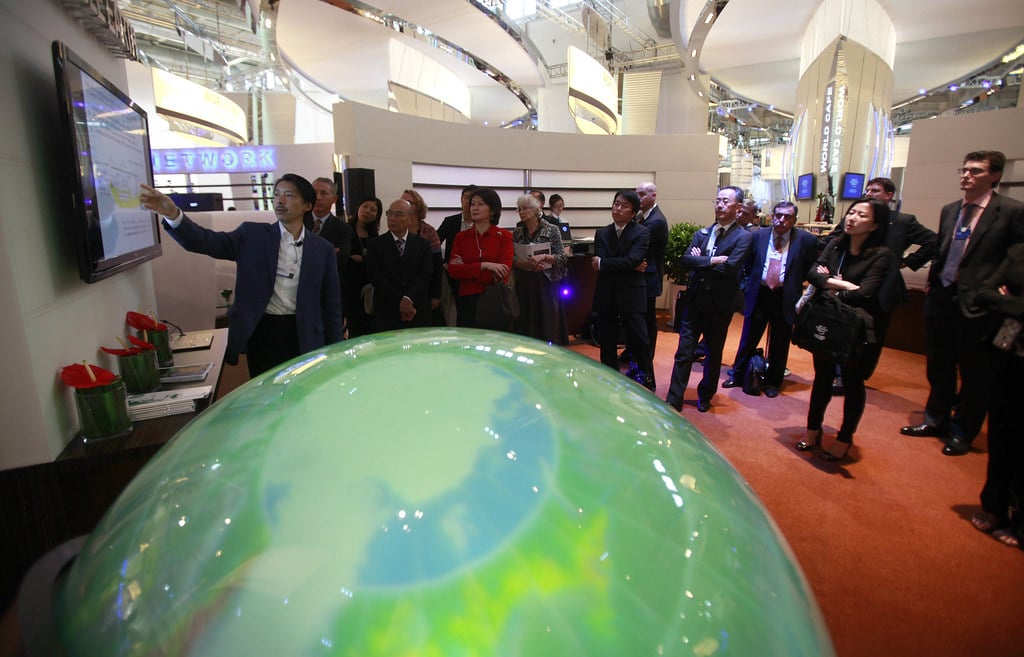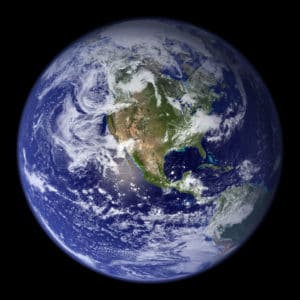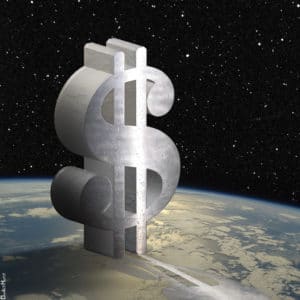
Economy vs. Ecology – A Battle of the Titans
by Stuart Scott
Certain sayings earn a place in human culture beyond what one would expect. “Houston, we have a problem” is such a saying. Uttered by Jim Lovell, commander of the Apollo 13 space shuttle mission, it has come to be an internationally recognized expression in the English language. Then, it conveyed a disciplined urgency. Today it conveys a situation so messed up that it would be humorous if it were not so serious. Three men floating in space had realized there was an urgent, life-threatening situation on their spacecraft. It was a threat that would result in certain death if not handled. But the tools they had to handle the situation were extremely limited. There was no possible other source of help from outside their small self-contained world except for their one lifeline of communications to the NASA Johnson Control Center in Houston, Texas.

There are over 7 billion humans living on Earth today, or rather on ‘spaceship Earth’, as it has been called, a relatively small mass floating in space. Unlike the Apollo space capsule, our life support systems are huge compared to our individual human size, but they are still limited. We have far more to work with to correct our problems. But with as many of us as there are, we have a huge collective footprint of needs and waste products, and our effect on spaceship Earth’s own life support systems has become similarly huge. We are in an urgent situation today on our relatively small planet floating in space, but there is no omnipotent ‘Houston’ to call to for help.
The Earth’s life support system lies in its natural resources and waste ‘sinks’, its ecology, providing the air, water, food and energy we need for survival. A frank assessment of the current state of Earth’s ecology, however, clearly indicates that like the Apollo astronauts, we are adrift in space with our life support systems severely compromised. If you are reading this article in this magazine, this is not news and you already know we have a problem. Indeed, the very term ‘ecological safety’ implies that there is a sufficiently unsafe condition that we must focus on, identify, explore and correct. The question becomes one of ‘how’ we correct the immense ecological problem that we have created for ourselves. To identify ‘how’ we must first become clearer on the root cause of the problem, since otherwise we will be simply addressing the symptoms of the disease and not its causes. Collateral questions are why we have let the problem get so out of hand, and why it is not more widely acknowledged as a problem, and how governments are not giving the problem appropriate weight in terms of legislation and expenditures to protect citizens.
To begin with, since we are using words to convey ideas about real systems, we must be clear on the difference between the ‘words’ themselves and the things that they represent. This is an obvious but critical distinction since mistaking words for the thing they represent far too often obscures our understanding of reality.
Let’s start with two particular words and the concepts that lie behind them; economy and ecology. They have a common root, ‘ecos’, which means ‘home’ in Greek. Each word represents an aspect of the management of humanity’s home, the Earth.
The word economy itself dates back some 500 years, and its original meaning was ‘home management.’ It has since come to encompass a massive system of interactions, exchanges, materials, energy, relationships, laws and customs that define ownership, privileges and responsibilities. For many people the word ‘economy’ provokes a very nebulous image that equates to ‘all that stuff.’ But what is also contained in the word is the implicit presumption that more ‘stuff’ is better both for individuals, nations, and humanity in general. After all, a growing economy keeps people happy by supplying them with enough goods and services in circulation, and the money to buy all the stuff they want.
From a microscopic, individual perspective that is the way it looks. So from a macroscopic perspective it should look that way too, right? What is the difference between filling one person’s desires and filling everyone’s? One might even assert that ‘economic safety’ is equivalent to economic growth. This is simply not so. Here I will deviate from the presumption that so many national leaders, economists, bankers and business people make. The basis of my objection will become clear in a few moments. But first let’s look at the ‘other side of the coin,’ so to speak.
‘Ecology’ is a much newer word, dating back only to the late 19th century. It denotes the interaction of living things with their environment and one another in communities that range in size from extremely local to completely global. The ecology of a place is a vastly complex reality comprised of the myriad exchanges of matter and energy by life forms with one another and with their environment. These interactions have arisen and evolved over 3.5 billion years, as life developed from simple atoms and molecules upon a once lifeless planet.
Ecology is thus a symbol for the patterns of material and energy exchanges for all of life on Earth. It symbolizes a incredibly large and complex body of interacting life as it has developed over billions of years. It is, in a sense, the ultimate physical reality for humans. Economy on the other hand symbolizes merely the interactions of humans with one another, and the interactions with the external environment from a purely human point of view. The reality it symbolizes is one that extends back at most 10,000 years.
The principles of ecology are derived through observation of reality. They are not mental constructs of a theoretical reality. The principles of economics, by contrast, are largely theoretical constructs about human behavior. Ecology is a descriptive, observational science that explores healthy and disruptive or degenerative relationships in natural biological communities. Economics, by contrast, is not even a science, or at best can be called a ‘social science,’ and in its present form is the study of human self-interest.
Now let’s get right down to the point. Humanity is provoking an ongoing ecological crisis. The very term ‘ecological safety’ in itself implies that something is deeply wrong with how we have arranged our affairs. We should not have to be campaigning for safe treatment of the only home we have. But the sad truth is we do.
The central, pivotal crisis we face is that our global economic system is at war with the ecology of Earth. This is the very real ‘battle of the Titans’ occurring every day. Past human greenhouse gas emissions, for instance, incur an extra heating of the Earth the equivalent of the heat that would be released by over 400,000 Hiroshima-sized atomic bombs being exploded every single day. The human economy is doing this. It is essentially a covert war that humanity is waging upon the Earth. How can we be so blind to not see this? It is because most people are much more comfortable avoiding the sad truth. The wealthier one is, the more one would need to give up to do one’s fair share of restoring balance, and so the more willing one is to avert ones eyes from the truth. Our limited self-interest blinds us to the impact of what we do.
There is the appearance that economy is winning the battle. But as it is sometimes said, “Nature bats last.” In the long run ecology will win in any confrontation between humans and the planet. When pressed too far out of balance, Nature will eliminate the source of the imbalance. That is, we are condemning ourselves to a very dire future, the decimation of our numbers and possibly the extinction of our species by our focus on money and our choosing, on so many levels, to avoid ecologically safe and responsible behavior.
In the current economic system, money is the only scale on which success is measured. Ethical treatment of other humans, ethical treatment of animals, conservation of non-renewable resources, and sound ecological treatment of our global commons are not factors of the current economic system. There are no scales upon which our economic activities are measured in these terms. They are ‘externalities’ to the economic equation. Why then are we at all surprised that the current economic system is trashing the ecology of Earth?
The current economic system is in fact a disaster for Earth’s ecosystem. Due to the immanence of climate change, we face this disaster much sooner than is commonly thought. Why are people asleep to the existential threat we face? Why are government leaders too willing to talk and so unwilling to act on climate change? It is because to recognize the real cause of climate change and other ecological imbalances would create an obvious and absolute imperative to change our economic system, since those who are most powerful in the current system are generally those who are making the most money from that system. So the unwillingness generally increases as we go up the economic scale of success.
If you have followed my arguments thus far you may be very worried, distressed and even depressed. I have so far offered no remedy, solution or intervention that might carry us out of dangerous ecological overshoot. So let me turn to what I consider to be the only hope we have of softening the impact of our ongoing collision with Nature.
First, we must recognize that the current economic system acts like an ‘operating system’ for global civilization. The analogy is quite apt if you think about it. The current system is the set of rules by which individuals, companies, governments, and non-governmental organizations operate. It is the ‘source code’ for our economic program.
Next, we must recognize that the current economic system is disastrously flawed.
Then, we need to recognize that the current economic system is not the only one possible. The current system actually has a name, NeoClassical Economics, but is also known simply as growth economics. But the ‘NeoClassical’ part dropped out of use in the early 20th century when several Wall Street banking moguls endowed (bought) the chairmanships of the economics departments of several key American business schools and all other schools of economic thought were purged from the curriculum. With no competing ideas, there was no need to distinguish the current system with a particular label.
As for the flaws, the common name growth economics points precisely to the fundamental flaw. Nothing can grow physically forever within a finite container, nothing. Yet NeoClassical growth economics posits that infinite growth is both possible and desirable. Perhaps in an imaginary world without limits to resources or limits to the marine, terrestrial and atmospheric waste ‘sinks’ in which we dispose of our waste products might infinite growth be theoretically possible. Welcome to reality. In this real world, there are limits to resources and waste sinks.
Not only does the current mainstream NeoClassical economic system seek to grow forever, it tries to do so at an exponential rate. Anything that grows as a percentage of itself is subject to the patterns of exponential growth. NeoClassical economics encourages this exponential growth both by its theory, and by its creation of ‘fiat’ money, that is money without any value based in reality, no backing in precious metals or other commodities, but only because the issuing agency says it has value.

Fractional reserve banking is another flaw, in force in most if not all current banking systems. It customarily empowers banks to create ten times as much fiat money (debt) as they have assets to cover their obligations. Thus the money supply in most countries tends to grow at an exponential rate as well, with banks having a great incentive to issue new loans (create new money) since the interests on these loans is highly profitable. In net, all of this expanding money supply chases after a dwindling supply of natural resources, creating an every growing footprint of waste, much of it toxic.
Finally we can turn to the glimmer of hope, the question of an alternative to the current deeply flawed economic system. There is such a viable alternative economic system. It has already been proposed, articulated, and elaborated for several decades, and it is being taught in many progressive educational institutions around the world. It is called Ecological Economics. Of course! If you want an economic system that does not form a parasitic relationship with the natural systems of Earth, model it appropriately as a subset of the ecology of a limited planet Earth and require that it respect that ecology and those planetary limits. Ecological economics does precisely this. But it also goes further and establishes ethical considerations that are fundamental to a well-functioning economic system.
It is beyond the scope of this article to provide a complete and comprehensive discussion of the flaws of NeoClassical Economics and the ways in which Ecological Economics avoids and addresses these flaws. But simply put, an economic system where money is the primary ‘good’ will tend in aggregate simply to create a lot of money. By contrast, an economic system that holds ecological and ethical considerations as fundamental scales of value in addition to money, will create well-being in many dimensions, including ecological safety.
The mere existence of Ecological Economics is not enough however. We must find ways to introduce this system to our governments, business leaders, and others. Despite the personal conflicts of interest of these individuals and organizations that commit them to the current flawed system, they must be made to see that the current economic ‘game’ is nearly over. The ecological collapse we are courting in the form of climate change, with all its subsidiary catastrophic symptoms, is bound to end the reign of NeoClassical Economics with the unraveling of the ecological fabric of Earth. The question is whether those who can make the change will recognize the coming collapse in time to create the change.
A proposal for a Nobel Peace Prize has been advanced that would help establish Ecological Economics in the minds of policy and decision makers. This proposal is couched as a Peace Prize for significant figures in the field of sustainable development. The proposal is outlined on the Internet at www.np4sd.org, where individuals can endorse the proposal and qualified nominators can actually send their nomination to the Nobel Peace Prize Committee. We encourage you to explore this website and learn whether or not they are qualified to nominate for the Peace Prize. There are millions of qualified nominators around the world unaware of their status. Even if you are not a qualified nominator, you are invited on that website to endorse the proposal as a member of the public.
Unfortunately, there is unlikely to be a happy ending to this story. But individual and collective action can affect the outcome, and reduce the painfulness of what is to come. This is a defining moment in human history. Will our collective short-sightedness, selfishness and cravings doom us as a species, along with more than half of all species on Earth? Or will we come to our senses in time to realize that life is more valuable than money?
It is the responsibility of each of us to determine the answer to that question. It is up to each of us and all of us how this ‘battle of the Titans’ of ecology vs. economy will end.
Stuart Scott,
Executive Director, FacingFuture.Earth
Executive Producer, FacingFuture.TV
contact@facingfuture.earth